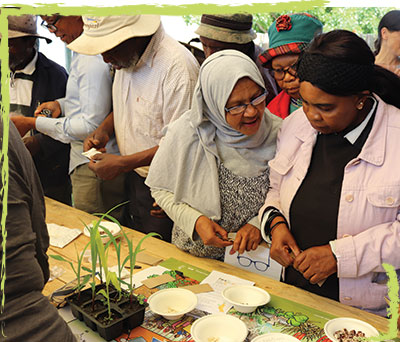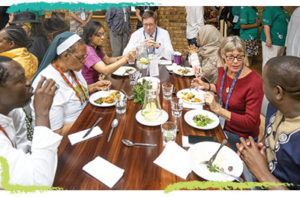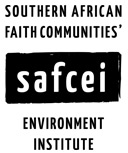
A contribution by SAFCEI
SAFCEI is a multi-faith organisation that supports Southern African faith leaders and communities in growing awareness of and acting on eco-justice, sustainable living and climate change. Based in Cape Town, South Africa with activities undertaken in 11 African countries.
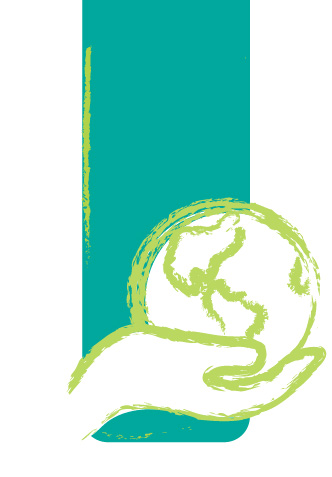
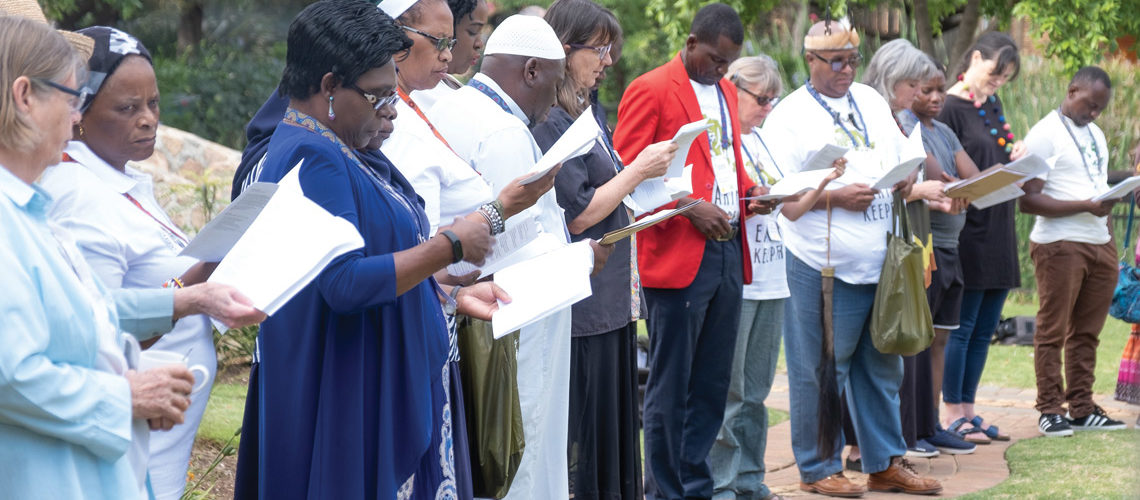
Advocating for ecologically and socially just policy frameworks
SAFCEI, established in 2005, works with a broad diversity of faiths, including African Traditional Healers, Baha’i, Buddhist, Hindu, Jewish, Muslim and Quaker communities, and a wide range of Christian denominations. Our members also include indigenous knowledge holders who identify as Khoi and San Traditionalists.
We speak out on issues of eco-justice, encourage ethical action in this regard, and call on those in positions of authority to govern ethically on matters concerning our common home. We advocate for policy implementation, policy change or policy intervention in a range of sectors that is both ecologically and socially just, that considers the context in which it will be applied, and that aligns with our ethos of caring for the Earth.
All faiths share a common mandate to ‘care’ for the Earth. This implies a responsibility to maintain and enhance the resource base on which all life depends.
Policy must spur on restorative action and support adaptive responses, as well as stipulate living within ecological boundaries.
Policy frames production and consumption behaviour
Patterns of production and consumption cannot be viewed in isolation. They are driven by a profit-oriented economic system that favours extractive resource use to the detriment of ecological health and social wellbeing and the promotion of a consumerist culture that takes us further away from our spiritual connection to Earth and the web of life it supports.
The destruction of the natural resource base and of the knowledge systems held by smallholder farmers and rural communities is disrupting the fabric of our society and irrevocably damaging Earth’s life support systems. One of these consequences is climate change, which will further compound issues of poverty, injustice, food and nutrition insecurity, and inequality. Climate change will affect everyone, but not equally.
Those countries where people consume less or often not even enough to support dignified lives typically have less capacity to adapt to climate change. Policy on climate change and related aspects therefore becomes a critical sustainability lever.
Policy to mitigate or adapt to climate change needs to consider social and ecological justice issues, both within and between countries.
Unpacking food and climate justice frameworks
Food customs and practices are deeply embedded in communities as cultural and ritual practices and are linked to faith traditions and cultural identity. Faith communities uphold the wholeness, divinity and sanctity of food and life, remembering that the physical intake of food has a spiritual dimension.
SAFCEI recognises that the right to food is a human right, enabled through the ability to produce or to buy food. The right to food is inextricably linked to the right to life and dignity. Food should therefore be available, accessible and adequate to all without discrimination.
Climate change compromises this already unmet or fragile right. In sub-Saharan Africa, climate change is starting to and will increasingly affect the ability of both commercial and smallholder farmers to grow food. Droughts and floods will devastate homes, public infrastructure and agricultural production.
The increase in average temperature, faster in Africa than many other places in the world, is already reducing yields. In particular, the poor and most vulnerable will have even less access to nutritious food than they do now. This will perpetuate the cycle of poverty and malnutrition.
Less food in the market will drive prices up making it even more unaffordable for the economically marginalised. This will deepen the food and nutrition crisis on the continent. A drop in calorie availability in Africa – because food is not available or affordable – will result in an estimated 11 million more children being malnourished in the coming decades.1 It will also affect the quantity and quality of food purchased by households, and influence how food is allocated within households, with negative implications for women and children.
The Intergovernmental Panel on Climate Change notes that most people and communities in Africa are directly reliant on the natural environment for survival and livelihoods, and do not have the necessary safety nets to adapt to climate change. We need sustainable food systems that build resilience to climate change, and that are socially just. This relies to a significant degree on having appropriate policy frameworks.
A sustainable food system in a context of climate change will produce a range of nutritious foods that are accessible and affordable to even the most vulnerable, farm animals ethically, empower women, and restore the health and diversity of life on Earth.
Disjointed policy framing and frameworks
We undertook an analysis of food and climate change governance structures in South Africa, Tanzania, Zambia and Zimbabwe to generate evidence to support our campaigns and calls for policy change. All four countries have signed the Paris Agreement and submitted nationally determined contributions. They have set up structures to monitor and respond to the impacts of climate change.
While policies are in place, there is little capacity and funding provided for implementation and coordination of food and climate justice concerns. The countries are not inclusive of civil society voices and their ideas on how to solve the intimidating interlinked challenges of climate change and food and nutritional insecurity.
In addition, there is no focus on dismantling the industrial agricultural model that is driving greenhouse gas emissions, polluting water and air bodies, destroying on-farm and wild biodiversity and marginalising the traditional knowledge that we will need more than ever before to adapt.
There is no mention, for example, of agroecology at the governance level or of any alternative approach to food production, distribution, marketing and retail that would support a transition to more sustainable production and consumption patterns.
African Faith Communities
Call on Gates Foundation,
“Stop Pushing Industrial Agriculture!”
A call for systemic change, starting with policy
We work with faith leaders across Southern Africa through our Faith Leaders Environmental Advocacy Training to help them reorient values of consumption within their communities based on our evidence-based understanding of the policy frameworks that determine unsustainable production and consumption.
Shifts in consumption values towards more Earth-friendly practices that both build social cohesion as well as the web of life can only take us so far. It is often the system itself that prohibits a sustainability transition.
1 Zewdie, A. 2014. Impacts of climate change on food security: a literature review in sub-Saharan Africa. ‘Journal of Earth Sciences Climate Change’ 5(8):225.
